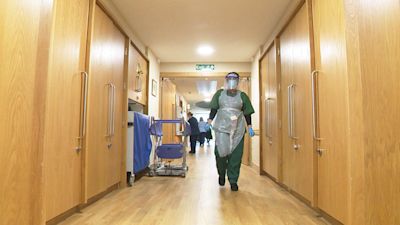Exclusive: Pressure on hospices 'relentless' as patients rise by one-third compared to first Covid wave

Video report by political correspondent Dan Hewitt
Hospices in England are caring for more than one-third more patients than in the first wave of the coronavirus pandemic, with one in three patients being discharged from NHS hospitals, ITV News has learned.
A survey by Hospice UK exclusively for ITV News shows that in the week beginning February 8, 35% of hospice inpatients came from hospitals, including people with Covid-19.
Around 23% of hospice patients being cared for at home also came directly from hospital settings.
In June last year hospices were caring for around 200,000 people per month, both inpatient and in the community.
In the week beginning February 8 this year, they were caring for 277,140 patients - a rise of 37.5%.
Coronavirus: Third of hospices on brink of redundancies and service cuts ahead of 'surge in demand'
Covid: Two thirds of hospices facing redundancies as government help runs out
Some hospices have set up entire coronavirus wards within their buildings as more patients with Covid-19 are discharged to relieve pressure on the NHS.
At Ashgate Hospice in Chesterfield, two of their inpatient wings are now designated solely for coronavirus patients discharged from the Chesterfield Royal Hospital, which reported earlier this month that all 16 of its ICU beds were full.
The hospice's Chief Executive Barbara-Anne Walker told us she is proud of the work they do relieving pressure on the health system, but said they need more government funding to carry on their work.
"The money we get from the NHS doesn't cover our costs under normal circumstances, and the additional money [from the government] is really very welcome but is only for just now and it doesn't cover all of our costs," Ms Walker said.
Hospice chief executive on the struggles facing her hospice:
"The NHS does not provide the care we provide, they're not able to, they don't have the capacity or the capability, so if we're not here to do it people will die in pain, they will die in distress, in a way that isn't necessary."
In November hospices were given £125 million to pay for additional capacity, but that money runs out at the end of March and the pressure on hospices is still intense.
The average adult hospice in England receives 32% of its funding from government health budgets, for children's hospices it is 17%.
The majority of funding is received through fundraising, but the lockdown has closed several sources of income including charity shops and large-scale fundraising events.
During the first lockdown, hospices lost £70 million in funding in one month.
In November hospices were given £125 million to pay for additional capacity during the winter, but that money runs out at the end of March and the pressure on hospices is still intense.
Hospice UK says it is crucial the government continues to provide additional help.
"We've got funding now until the end of March, and we're in active discussions with the government about extending that," said Tracey Bleakley, CEO of Hospice UK.
Hospice UK CEO on need for more funding
"We know that it is going to be crucial to keep hospital capacity open after that for Covid patients and into recovery so we're really hopeful we can secure additional funding."
At Ashgate Hospice, they have up to eight Covid-positive patients per day.
Tight infection controls mean they have so far avoided any Covid outbreaks among staff or other inpatients, but the pressure is taking its toll.
Hospice nurse on the huge workload increase during the pandemic:
"We've always done end of life care but I think it's been the turnover of patients and the turnover of the number of deaths in a shift," said nurse Sarah Kerry.
"It does increase the workload and it just puts pressure on staff. It's an emotional burden as well, it takes a lot out of you to care for people at end of life, so it is challenging."
Nurse Helen Beard told me it's often on the drive home, after a 12-hour shift, that what she has witnessed sinks in.
She said: "Obviously, we've been having lots more patients and more deaths really.
"I've had to deal with three patients that have passed away during one shift. It's hard sometimes to come to terms with what's happened really."
ITV News have approached the Department for Health and Social Care for comment.
Covid: Vaccine passport talks ongoing with foreign nations as hopes rise for domestic holidays
Hospices running out of basic medical and cleaning supplies in fight against coronavirus